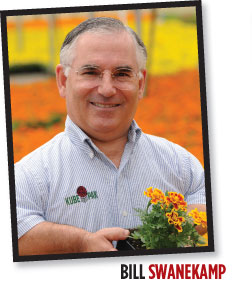3/1/2019
The Times They Are A-Changin’
Bill Swanekamp

In 1964, Bob Dylan was inspired to write his famous song “The Times They Are A-Changin’” in response to the unrest in this country over the war being fought at that time. Dylan sensed there was a groundswell of change in the air and wrote about the need to keep up with the changing times.
I would have to say our industry is going through a similar time of change in this country. It’s been coming over the past five to 10 years, but seems to be accelerating lately. There are three main areas of change that I’ve observed.
First, is the number of greenhouse businesses that are closing their doors either through bankruptcy or retirement. Last year, the largest horticultural business in the U.S. declared bankruptcy. There were other notable large operations that closed their doors as well. This trend has its roots in the historically low prices we command (or don’t command) for our products.
It’s not uncommon for a greenhouse business to not increase their prices for years. Sometimes, there are small annual increases, but these don’t compensate for even simple inflation. Of course, the consequence of price stagnation is an erosion of profitability. Once profitability drops, then the ability to reinvest in your business and keep it up-to-date stops as well.
Now the downward cycle has begun. Once it begins, it’s very hard to reverse because the cure is significant price increases in one year. Price increases are always resisted, but trying a large one within the same year may be too much for your customers.
On the other hand, if you make small, but measured, price increases each year, your good customers and vendors will usually work with you. If they don’t, it might be time to look for other outlets.
I always marvel at what other companies outside of our industry charge for their products. Last week, we had to replace a 30-year-old 100-amp (480V) circuit breaker. Guess what they charged us for a breaker that was the size of a 6-in. cube? $1,050.00. Yes, over a thousand dollars. Interestingly, they didn’t send a letter of apology with the breaker or even ask us if this price was okay. “Here it is—take it or leave it.” Wow! Maybe we have some lessons to learn from companies outside of our industry.
The second area of change has to do with new laws with respect to our employees. In October of 2018, New Jersey passed a law requiring all businesses to provide up to five days of paid sick leave. Although I can understand the need for this law since so many of our employees make just enough money to survive week to week, it’s still an additional burden on our profitability. It’s as if we now have to give each employee an extra week of vacation pay. This will cost us about $75,000 per year.
Another law that’s being debated heavily throughout the country is the mandated minimum wage of $15.00 per hour. I certainly understand this law because you cannot live in New Jersey and survive on the present minimum wage. Currently, we’ve adopted the $15.00 per hour wage as our new minimum. This isn’t out of altruism, but because no one will work in our greenhouse for less. It might be easier to swallow an increase in the minimum wage if it was done gradually over the past 10 years, but most states and the Federal government have not taken this approach.
The third area of change has to do with large, established growers switching their production from traditional crops—such as bedding plants, hanging baskets and potted crops—to other non-color crops. Two large growers in New Jersey made significant changes this past year. One of them sold their business and is now managing the production of cannabis in their facility. Another stopped growing plugs for sale through the broker network to focus on other, more profitable, edible crops.
I just heard of a third grower who discontinued all production of finished flowering crops to grow hemp seedlings. He also stopped production of flowering plugs to make room for the hemp seedlings.
How does this affect us? In a positive way? Yes—those customers are calling us to place orders.
What’s the bottom line here? The times they are a-changin’. As an industry, we need to keep a close eye on the changes either being forced on us or the ones we’re voluntarily making and carefully plan how they’ll affect our profitability. GT
Bill Swanekamp is president of Kube-Pak Corp., Allentown, New Jersey.